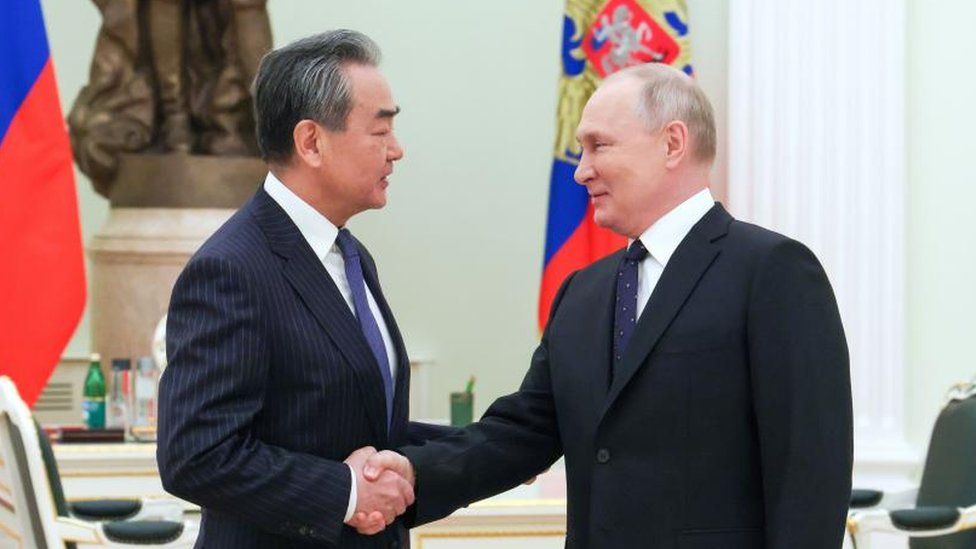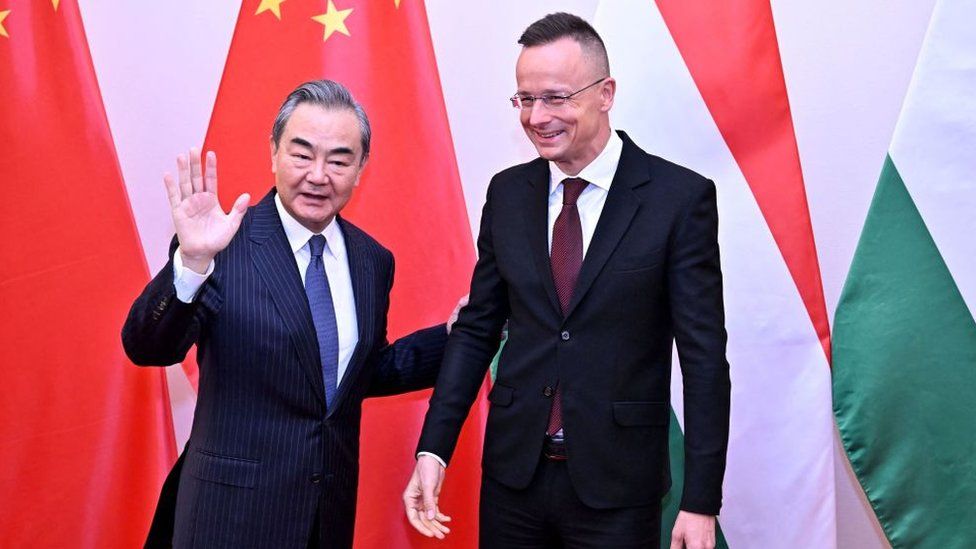The West has been begging China to aid in ending the Ukraine war for the past year. Beijing has now made its firmest response to date, which is not what many people in the West would prefer.
The recent assertive charm offensive by China began with top diplomat Wang Yi's trip to Europe, which culminated in a cordial reception by Vladimir Putin in Moscow.
Beijing has published not one but two position papers, the first of which offers a peace plan for the world and the second of which offers the Chinese response to the conflict. These largely restated the talking points China has repeated over the past year, calling for respect for sovereignty (for Ukraine) and the defense of national security interests (for Russia), as well as opposition to the use of unilateral sanctions (by the US).
It's possible that the West won't be impressed, but Beijing's main objective was probably never to persuade them.
The first is that it is obviously trying to establish itself as a global peacemaker. In one of its papers, it mentions engaging South East Asia, Africa, and South America - the so-called Global South - which gives away a clear hint as to who it is really trying to charm.
Preaching an alternative to a US-led global order, it is courting the rest of the world, which is keenly watching how the West manages the Ukraine crisis.
Sending a strong message to the US is another objective, though.
There is a hint of defiance, according to Alexander Korolev, a Sino-Russian relations specialist at the University of New South Wales. It is saying, "I have someone to go to if things get tense between us. Don't feel free to bully me; Russia is not alone, which means that I will not be alone in a conflict. '".
According to observers, the timing is a giveaway. The spy balloon saga has further deteriorated US-China relations, which have already reached a new low. Some have also questioned why China has only now launched its significant diplomatic campaign for peace in the Ukraine.
China was invited early on to contribute to ending the war, so it had plenty of opportunities to show leadership, according to Dr. Korolev. "If the goal was to truly display the image of a global leader, you don't have to sit on the fence for one year and try to perform a diplomatic dance," he added.
There was a third objective, which was evident from Mr. Wang's schedule.
Mr. Wang may have been experimenting to see if China could entice some of Europe into its orbit by traveling to France, Germany, Italy, and Hungary, whose leaders China perceives as taking a less hardline stance toward Russia.
According to Zhang Xin of the East China Normal University, a specialist in international political economy, Beijing sees a "logical convergence of interests" with these nations. It holds that the US possesses hegemonic power and that the Transatlantic region as a whole would profit from breaking away from that system. ".
However, it's doubtful that China will be successful in achieving that specific objective. Mr. Wang's speech at the Munich Security Conference, in which he criticized the US, did not sit well with the US's most ardent allies and, in the opinion of diplomats, only increased mistrust of China's true intentions.
His visit was "a very overt push to say: 'We don't have problems with Europe, we have problems with the US, we can fix things with you Europeans and you need to understand that the US is leading you down a problematic road,'" according to Andrew Small, a senior fellow at the German Marshall Fund think tank who specializes in Europe-China relations.
"However, I believe that this message isn't very well received in most of Europe. ".

The main issue at hand is whether Beijing will honor its promise to make peace even as it tightens its embrace of Russia.
This week, the US issued a warning that China was considering providing lethal weapons to Russia and that Chinese companies had already begun supplying non-lethal dual-use technology, such as drones and semi-conductors, that could be used for both military and civilian purposes.
China has publicly reacted with vehement language. However, Mr. Wang made it clear to top EU official Josep Borrell in private that they would not be supplying Russia with weapons.
Mr. Wang also reportedly questioned Mr. Borrell, "Why do you show concern for me possibly providing arms to Russia when you are providing arms to Ukraine?" This is a telling statement, say observers, demonstrating how Beijing still firmly believes the West is to blame for igniting the conflict.
According to the Chinese government's current position, sending weapons to any combatant is considered to be a further escalation, according to Dr. Zhang.
Given how it conflicts with Chinese interests, it is doubtful that Beijing would give Moscow weapons.
Others would interpret such a move as a blatant escalation of the conflict, which would result in sanctions and the disruption of trade with the West. This would be extremely harmful for China, as the EU and US are two of its top trading partners.
In addition, it would likely intensify tensions on a global scale and draw US allies closer to the US, thwarting Beijing's attempts to court some of them as it mounts a challenge to the US.
According to observers, Beijing is more likely to continue or even step up indirect support, such as increasing economic trade, which has given Moscow a financial lifeline, and refraining from sanctions against Russia.
Dr. Small speculates that in order to provide assistance "as covertly as possible," they may even supply more dual-use technology through other nations like Iran or North Korea.
He did, however, issue of giving lethal weapons will resurface as the war drags on.
Because Russia previously didn't need to resupply, Dr. Small said that the question of what kind of significant things China could be asked to do hasn't been raised yet. However, they have reached that crossroads. How long will China continue to refuse to cooperate with Russia?
Vladimir Putin and Xi Jinping declared they had a "friendship without limits" just days before war broke out in Ukraine.
After a year, China will have to respond to the query of how far it would go for its unique friend.







